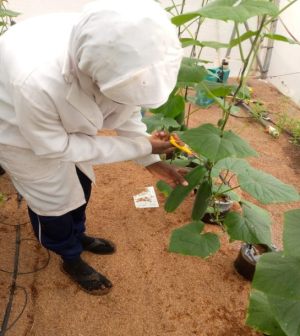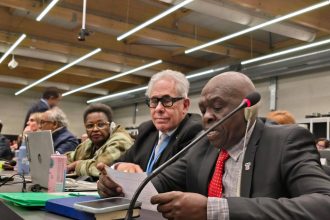By Africa Science News
Mariam Olamide Kareem, an emerging Nigerian soil scientist, is gaining international recognition for her groundbreaking work in soil health, water-use efficiency, and sustainable agriculture—research that is helping shape climate-smart farming across arid and semi-arid regions.
Currently a doctoral researcher in Soil Microbiology at New Mexico State University (NMSU), USA, Kareem’s journey reflects Africa’s rising leadership in scientific innovation. Before joining NMSU, she completed a World Bank–funded MPhil in Irrigation and Drainage Engineering at the University for Development Studies (UDS), Ghana, and conducted influential greenhouse research at the Council for Scientific and Industrial Research (CSIR-SARI) in Northern Ghana.
Optimizing Water Use for Greenhouse Farming
 Kareem’s master’s research focused on how different irrigation regimes and growing media affect the yield and physiology of greenhouse cucumber—a high-value crop widely grown in semi-arid zones. Her study tested three irrigation levels—100%, 75%, and 50% of crop evapotranspiration (ETc)—and three growing media: soil, soil mixed with charred rice husk (CRH biochar), and cocopeat.
Kareem’s master’s research focused on how different irrigation regimes and growing media affect the yield and physiology of greenhouse cucumber—a high-value crop widely grown in semi-arid zones. Her study tested three irrigation levels—100%, 75%, and 50% of crop evapotranspiration (ETc)—and three growing media: soil, soil mixed with charred rice husk (CRH biochar), and cocopeat.
The results were striking:100% ETc produced the highest yield of 116.3 t/ha, but 75% ETc achieved nearly identical productivity (70.6 t/ha) while saving substantial water.
The study found that cocopeat supported excellent root growth and fruit development, while soil mixed with biochar improved leaf expansion. All media were profitable, but soil remained the most economical. However, biochar and cocopeat-based media showed strong potential once cost barriers are reduced.
Her recommendations included using 75% ETc irrigation for optimal water savings, promoting CRH as a low-cost substrate, and combining cocopeat and biochar to balance water retention and aeration.
Advancing Soil Microbial Science
Now at NMSU, Kareem is expanding her research to investigate how soil amendments influence microbial diversity and nutrient cycling in drylands. Her doctoral work explores the microbial mechanisms that support carbon sequestration, nutrient mineralization, and plant stress tolerance—knowledge that is critical for building resilient farming systems amid worsening climate pressures.
Through field, greenhouse, and laboratory studies, her research aims to develop soil management strategies that strengthen productivity in water-limited environments.
A Model for Climate-Smart Agricultural Innovation
Kareem’s contributions stand out for their scientific rigor and practical relevance. Her work: Provides empirical evidence that greenhouse farmers can cut water use without sacrificing yields, demonstrates the potential of biochar and other low-cost substrates in controlled-environment agriculture and adds new insights into how soil–water–substrate interactions influence plant physiological performance.
In addition, it offers models for economically optimized substrate selection for smallholder growers, supports global shifts toward circular economy solutions through the use of agricultural residues like rice husks.
Africa’s Growing Footprint in Agricultural Research
From her early academic years in Nigeria to her international research in Ghana and the United States, Mariam Kareem represents a wave of young African scientists driving solutions to global food security challenges. Her work bridges science and practice, delivering innovations that can help communities adapt to climate change while improving soil health and agricultural productivity.
As climate threats intensify, researchers like Kareem are shaping a future where science-driven, eco-efficient agriculture supports resilient livelihoods across Africa and beyond.




